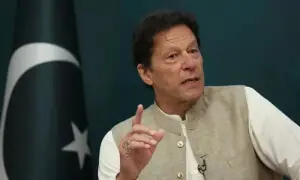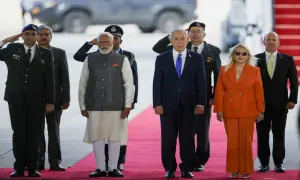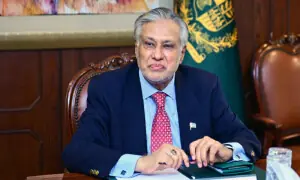Dar announces plans for mini-budget with Rs170 billion in new taxes
3 min readFinance Minister Ishaq Dar announced that new taxes Rs170 billion would have to be imposed to comply with IMF demands and a new finance bill will have to be passed to impose them.
Addressing a press conference in Islamabad on Friday morning after the departure of the International Monetary Fund’s team, he said that fixing things recommended by the IMF was ‘in Pakistan’s interest’.
Read more: No agreement, and long list of demands as IMF team leaves
While a staff-level agreement has not bee reached, Dar said that talks had ended on a ‘positive note’.
He also said that the requirement of raising petrol prices by Rs50 had been met. However, he also indicated that diesel prices could go up by Rs10 soon.
The finance minister said that the speculations about Rs 500-600 rupees in taxes being imposed is not correct. The correct amount of new taxes will be around Rs170 billion.
He specifically mentioned the energy sector as an area which needed reforms and said that targeted subsidies would have to be reviewed.
“We will try to ensure that we do not burden poor people,” Dar said.
Last week, Prime Minister Shahbaz Sharif called Pakistan’s economic situation “unimaginable.”
“Ideally, Pakistan should have reached a staff level agreement at the end of the IMF mission,” Khaqan Najeeb, a former finance ministry adviser, told Reuters.
“Delay is untenable.”
IMF measures
The so-called staff-level agreement, which then needs to be approved by the IMF’s head office in Washington, must be reached before the funds are disbursed.
In addition to the stalled tranche, another $1.4 billion remains of the $6.5 billion bailout programme, which is due to end in June.
Experts said Pakistan needs the payout as soon as possible.
“If this drags on for, say, longer than a month, things get more difficult as our forex reserves have reached a critical level,” former central bank Deputy Governor Murtaza Syed told Reuters.
The conditions set by the IMF include a return to a market-based exchange rate and higher fuel prices, measures that Pakistan recently implemented and that have already sent inflation to a record high - 27.5% year on year in January – and created shortages in some imported goods.
Dar said Pakistan had also agreed with the IMF to introduce fiscal measures, including new taxes.
Analysts fear more fiscal tightening could tip the economy further into crisis.
“The government has not only wasted over five months in realising the gravity of the situation, it is still sleepwalking the country into an economic abyss,” said Sakib Sherani, who served as the finance ministry’s principal economic adviser in 2009-10.
Pakistan’s bonds dive
Pakistan’s government bonds slumped on Friday after the country’s bailout talks with the IMF ended without an agreement. The country’s bond due for repayment the soonest, in April 2024, tumbled 4.6 cents on the dollar or roughly 9%.
Other bonds with longer repayment dates fell between 2 and 3 cents to leave them at less than half their face value.
An IMF staff mission visited Islamabad from January 31 until February 9 to discuss the ninth review of a $7 billion loan programme.
The Washington-based lender has asked for more time for negotiations with Pakistan over a deal that would unlock $1.1 billion in much-needed funds for the country, Secretary of Finance Hamed Sheikh said on Thursday.
For the latest news, follow us on Twitter @Aaj_Urdu. We are also on Facebook, Instagram and YouTube.

























Comments are closed on this story.